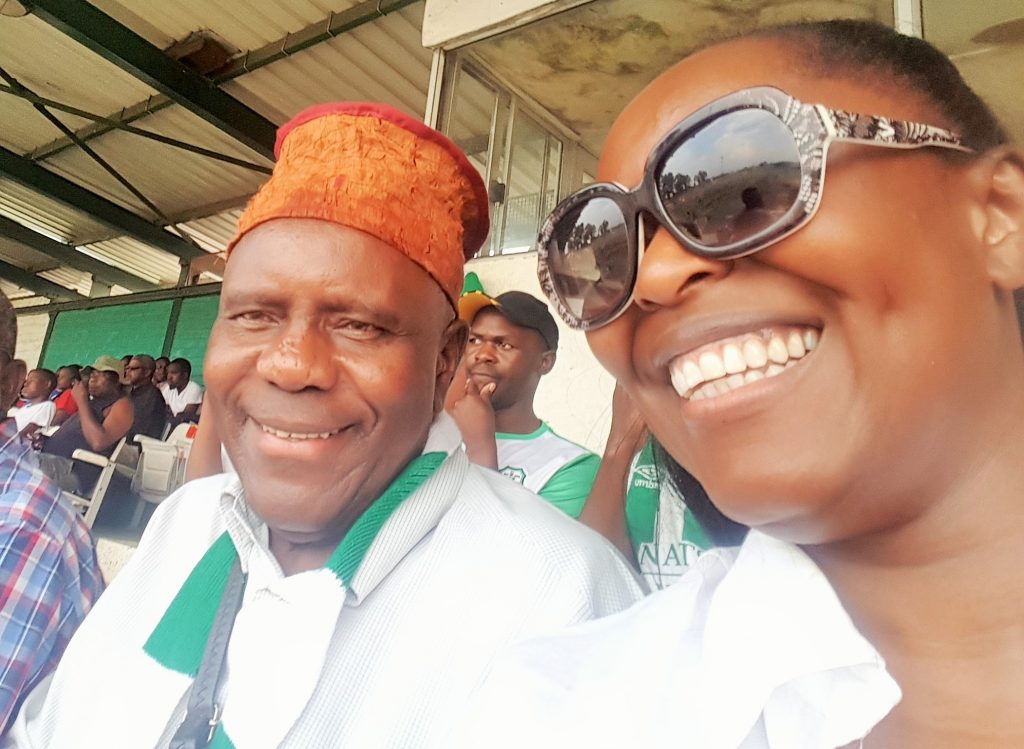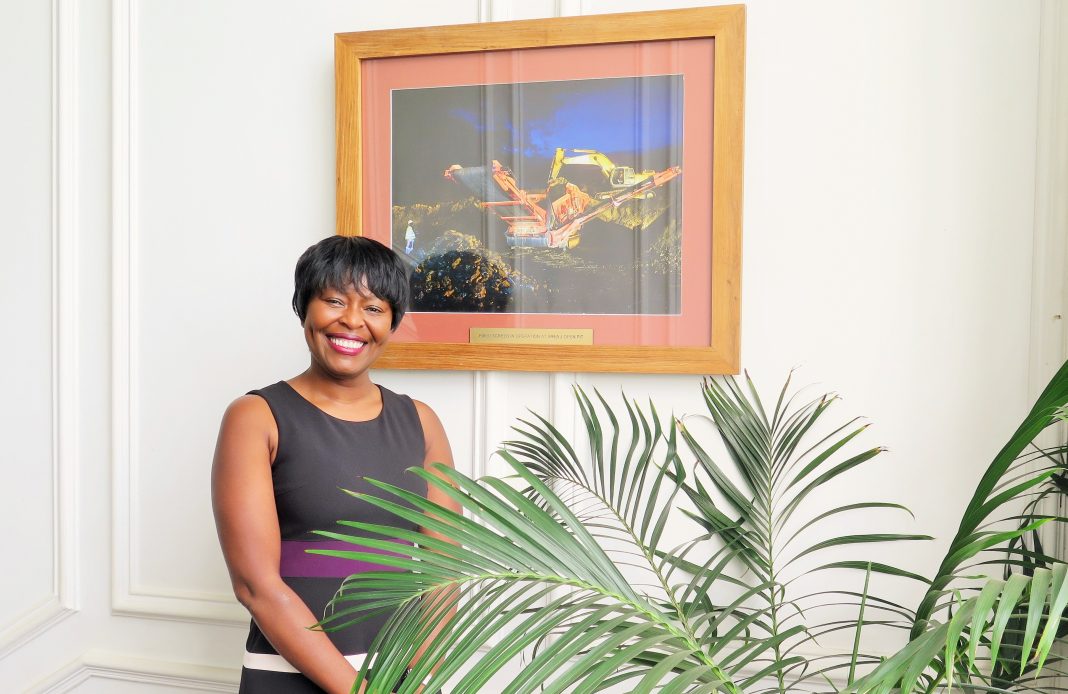We sat down to meet the charismatic person behind one of Mopani’s most important roles – Chief Services Officer, Senga Chitoshi – and found out how a “girl from Muf” ended up in the same industry as her father, and why the January sales are what she misses most about living in the UK.
Both your grandfather and father worked for the Mufulira mine, but family history didn’t convince you to join Mopani as Company Secretary in 2006. What did?
It was a great opportunity that came at the perfect time. Mopani is a huge company. At the time, I think it was the second largest company in the country and had over 20,000 employees, and I was coming from an organisation with 600 employees. I knew I’d be challenged incredibly because mining has such a big footprint, and that I’d be exposed to all kinds of legal issues and challenges.
The reason I say it was perfect timing is my husband had just gotten a radio broadcasting license in the Copperbelt.
Where did you two meet?
We met while studying for the bar [legal practice certificate] in Lusaka.
Your legal qualifications were a big draw to Mopani. What other qualities do you think Mopani valued?
I think probably my multicultural upbringing. Yes, I’m Zambian and from Mufulira, but I went to a very mixed, multicultural boarding school in the UK, with lots of army children from around the world. I think also my international exposure: I worked for a year in London after graduating. So there was the diversity of my upbringing and the diversity of my work volume because I had worked as a criminal prosecutor and in a private practice, and then went into the aviation industry.
I think a diverse legal background stood well with the mine because there are so many facets: environmental, commercial, employment, general corporate… I had a very multicultural interview panel – a Swiss-German director, a Scotsman, a South African, and a Zambian – and I was probably able to relate to each of them.
Did you always suspect you’d come back to Zambia?
Yes, I always planned on studying in the UK and moving back to Zambia – but I might have stayed on in the UK a little bit longer if I hadn’t met my husband.
When you became Chief Services Officer four years ago, what were your top priorities?
My priority was understanding my new team: understanding the strengths and weaknesses, growing the strengths, addressing the weaknesses, and also getting the Human Resources side of the services team to be more proactive, and to work with the business.
It was almost a shift in how we had operated before because we now had a new company strategy. Two of our pillars (people and sustainability) really hinge on the services departments being able to deliver, so my priority was getting the cohesion of the team, and becoming more proactive and more efficient.

Did the new company strategy coincide with you taking up the role?
Yes. It was perfect timing actually because people tend to be resistant to change, so if there is change all around you, it’s easier to say, ‘We’re part of this change and this is our role in this journey.’ So that was very exciting. But it also happened in a very challenging year: 2015. Six months after I was appointed we had a multiple fatality, and towards the end of 2015 we had huge retrenchments related to the [copper] price drop, and lost almost half of our workforce. So that was a year where, by the end of it, you’re coming out thinking, ‘Okay, I’m stronger than I thought I was.’
It was very important during that year to learn how to execute everything with heart. You had to understand where people were coming from; you had to be able to take the time to listen. I would say that was one of my priorities: to get more empathy and heart while still being efficient.
You deal with everything from medical services to corporate affairs. Is there a common set of values in your approach?
Yeah, I would say there is. The common theme is for us to be proactive, to add value to the company, and to try and achieve cohesion – because otherwise you’re working in your silos.
You maintain relationships with all kinds of stakeholders with different goals, from people on the ground to government. How do you handle that?
In each set of meetings I go into, I try to understand where the other party’s coming from. If I go into a meeting and I say, ‘Well, this is the Mopani position and that’s it,’ it really isn’t going to get us very far. Particularly with the unions, let’s say, we have managed to have smooth negotiations over the last four years, and that’s pretty much because we do understand where the other party’s coming from. You put yourself in their shoes just for a minute and say, ‘Okay, but what would be some kind of compromise?’ And then when we talk about divergent interests between stakeholders, it becomes a case of looking at ‘Well, who does this impact the most?’
In each set of meetings I go into, I try to understand where the other party’s coming from. If I go into a meeting and I say, ‘Well, this is the Mopani position and that’s it,’ it really isn’t going to get us very far.
What has changed since you first started in this role?
We went through 2015 and the huge upturn of the retrenchments. But I would say after that, we’ve come out as a stronger team. There’s still a kind of stress, but it’s a positive stress because now we can see where we’re heading.
We’re very excited about being part of the operational readiness [of the new shafts project]. The shafts are coming in this year. We’ve seen the efficiencies of one of the new shafts [Synclinorium Shaft], which tells us we’d be in a much better place if the market crashed again.
It’s that feeling of being part of a journey: we’re not just here to move papers from office to office or to get money to give to the community. We’re building something together. The challenges will always be there, but they’re positive challenges. I don’t mean to sugar-coat it because we have had our dips, but when you weigh it all up, I’m still excited to come to work.
Mopani runs several CSR initiatives, including an HIV treatment and prevention programme. Are there any projects that you watch particularly closely?
Yes. There’s currently a farming project where we’re trying to get members of the Kantanshi community trained in agricultural poultry keeping. That’s a project that I’m very happy about because we do need to get to the point where there are other forms of livelihood; we are trying to contribute to developing resilient communities [in Kitwe and Mufulira].
On the HIV side, I keenly follow the programme on prevention of mother-to-child transmission. I’m always looking at the statistics – and we do have very, very good statistics – but even on the occasion where we have the one case of a mother transmitting HIV to her baby, I will ask why this happened. It’s never a case of the treatment failing – it’s always something else. Then we look at whether we need to bring in more counselling. How do we prevent this from happening? Because even just one baby is one baby too many.
Those would be my two pet projects. But the one that’s really close to my heart strangely enough is football – Mufulira Wanderers… I’d never think as a girl from Muf’ that I’d have any influence over getting that team any money, or any support! So it’s with great pride that I can take my Dad and go and watch Mufulira Wanderers because, yeah, that’s our team.
The funniest thing with taking up this job was going to watch Mufulira Wanderers play Nkana Football Club. They’re both our teams. And I sat there in purple because Mufulira Wanderers is green and Nkana is red. And I said, ‘Well, unless you get me a shirt that’s half red and half green, I’ll wear purple.’
What do you miss about your British “home”?
The one thing I do miss is the Christmas sales… They’re fantastic! I have been known to have queued up at 5am with my tea flask waiting for Next [the clothing store] to open!
While you were living in Britain, what did you miss most about Zambia (besides your family)?
It was obviously the weather. The weather can be so miserable and, in the dead of winter, the darkness at 4pm does affect your mood. Living in London wasn’t so bad because it was quite cosmopolitan, but being away from London in a very, very English setting makes you miss Zambia even more. Zambia’s all smiles and the UK just isn’t…
See also: Lets talk

























